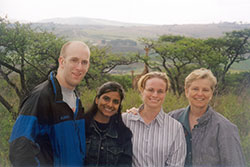This summer, more than 20 law students provided valuable legal services and engaged in international public interest work with legal aid organizations, non-government organizations (NGOs), and international courts in South Africa, Ghana, Rwanda, Somalia, Chile, China, Korea, and The Hague. The students’ intensive professional development assignments ranged from training paralegals through community empowerment initiatives to addressing land right and housing issues, conducting dispute resolution with nomads in the desert, assisting in arbitration of international commercial disputes, researching practices for micro loans, promoting civil justice reform, drafting legal memoranda for international courts, and studying international law and practice. Some students interned through the law school’s Global Public Interest Law Fellows Program, while others participated through the Whitney R. Harris World Law Institute‘s Dagen-Legomsky International Fellows Program.
To date, more than 170 students have interned and studied overseas under the Global Public Interest Law Fellows Program. The program builds upon the African Public Interest Law & Conflict Resolution Initiative, started 13 years ago by Karen Tokarz, the Charles Nagel Professor of Public Interest Law & Public Service and director of the Negotiation & Dispute Resolution Program.
“I spent fall 2001 as an Israel Treiman Faculty Fellow at the University of Kwa Zulu-Natal Law Clinic in Durban, South Africa, where I met several lawyers with the newly instituted Legal Aid Board of South Africa, tasked with providing representation for criminal defendants and low income individuals in civil cases,” she says. “These lawyers offered to collaborate in an international internship program, which we started in Durban the following summer.” Since that time, the law school has expanded internship placements into Ghana, Rwanda, Tanzania, Kenya, the Democratic Republic of Congo, and Somalia – and, more recently, into Latin America and Southeast Asia.
The Dagen-Legomsky International Fellows Program has long supported students studying and working abroad, says Leila N. Sadat, the Henry H. Oberschelp Professor of Law and director of the Whitney R. Harris World Law Institute.
“For more than a decade, the Dagen-Legomsky Program has provided amazing opportunities for law students to experience and learn international law and practice,” Sadat observes. “In recent years, students have worked on human trafficking in Thailand and immigrant and refugee rights in Northern India, assisted counsel in trials before the Extraordinary Chambers of the Courts of Cambodia, interned with the European Council on Refugees and Exiles, and attended The Hague Academy for International Law.”
“Globalization has brought a new understanding that our justice is inextricably linked to that of others around the world. The Global Public Interest Law Fellows program is training the next generation of lawyers to meet the challenge of improving access to justice and reducing disparities within and across borders,” Tokarz says. “Our students have sought to work with legal services providers, NGOs, and courts all over the world, in and beyond Africa. Whenever possible, we have assisted them.”
Training Paralegals in Accra, Ghana
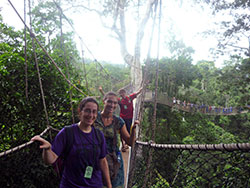
Internships in Ghana were initiated by Sena dei Tutu, JSD ’07, an alumna from Ghana, whom Tokarz visited in fall 2006, and law students have interned there every summer since. For current law students Jim Ransdell and Rachael McLain, who spent their first-year summer working with two NGOs in Accra, their internships furthered their international learning and piqued their international career interests.
Ransdell interned for the Legal Resources Center (LRC), an NGO that provides research, advocacy work, and advisory services. LRC’s clients include individuals, organizations, and communities. McLain worked for the Federation of Women Lawyers-Ghana (FIDA-Ghana), an agency that addresses discriminatory practices affecting women and children. Both students also helped to train paralegals to meet the country’s need for legal representation.
“The LRC helps prepare paralegals through trainings coordinated by the LRC executive director,” Ransdell says. “Most of the teaching materials are prepared by interns, like me. Given that 80 percent of the population relies on legal services through paralegals, rather than lawyers, training is hugely important.”
McLain helped train female tribal and community leaders to be paralegals at FIDA-Ghana. Like Ransdell, she created training programs and documents, while teaching leaders about key issues that confront women in the affected areas.
The two also had the opportunity to visit with Edgar Mason, JD ’04, who interned in South Africa in the first year of the Africa Public Interest Law Initiative and now works as a senior regional Government Specialist at USAID West Africa, based in Accra. “We saw first-hand how our internships might lead to international careers after graduation,” McLain says.
Learning Lessons in Comparative South Africa
Students Erika Hanson and Sam Stragand worked at the Legal Resources Centre (LRC) in Durban, South Africa, where they addressed land rights, housing rights, access to administrative justice, environmental law, contract law, disability discrimination, and pension fund issues. In addition, Hanson worked on the LRC’s equality and non-discrimination focus area plan for the future.
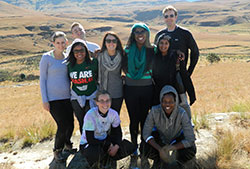
“The best part of my experience was the trust and responsibility that the supervising attorneys and the candidate attorneys gave us,” Hanson says. “They used our research, memos, and legal ideas in representation of clients, which was enormously rewarding. I’ve learned more about the practice of law in 10 weeks than in all of my first-year courses, because I was operating in context with real clients and real cases.”
Stragand says his most memorable experiences in the office were when he and Hanson discussed complex legal issues with their co-workers, many of whom were close to their own ages.
“Those conversations were stimulating on so many levels—legal, political, social, economic. We found that our ideas were respected, welcomed, challenged, considered, and even praised,” he says.
At the LRC, Hanson and Stragand sat in on client consultations and depositions, and went into the townships with their supervising attorneys to see clients. “We learned a great deal about the South African legal system, including its complexities, and the comparative differences among law, legal practice, and justice in South Africa, the United States, and Britain,” Stragand says. “It was a lesson in comparative law that has prompted me to want to explore comparative law more when I return to classes. I feel I grew immensely in my sense of myself as a legal professional.”
Eight additional law students interned and studied in South Africa this past summer. Melissa Weiss, interned in Durban with Lawyers for Human Rights, an immigration and refugee advocacy organization. Christina Francois, Tom Hastings, Phoebe Jean-Pierre, Claire Sabourin, Sandhya Sharma, and Marie Washington interned in Durban with the Legal Aid Board, which is the law school’s longest standing African partner. The law school has collaborated with the Legal Aid Board since Tokarz’s first visit to South Africa in 2001. Meanwhile, Ana Nettles, studied comparative dispute resolution, constitutional law, and criminal law in Cape Town through the University of Missouri Summer School.
Focusing on Transitional Justice in Rwanda
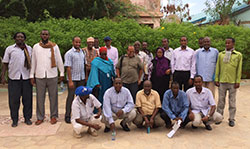
Law student Abadir Barre spent the summer working for the Puntland Legal Aid Center (PLAC) in Somalia, his homeland. His family was displaced as a result of a coup when he was 9, and he has wanted to return to help the now stabilizing parts of the country in the north. Because of his family’s former roles in government, he had access to a large number of individuals engaged in rebuilding the legal system and developing the new constitution.
At PLAC, Barre helped conduct informal and formal dispute resolution through the United Nations Development Programme (UNDP) Travelling Mobile Court, implemented in 2009 to give nomadic Somalis access to the judicial system. The Travelling Mobile Court seeks to provide access to the courts, availability of dispute resolution, and a sense of rebirth of the rule of law to parts of the war-torn country outside of the cities.
“I gained incredible experience working in Puntland assisting PLAC’s lawyers, paralegals, and staff with criminal and civil cases, and with constitutional development,” he says. Read More
Reforming Justice and Helping the Environment in Santiago, Chile
Dagen-Legomsky Summer Public Interest Fellow Ashlin Mosby spent her summer in Santiago, Chile, working for the Justice Studies Center of the Americas (JSCA), an autonomous, inter-governmental entity whose mission is to support the Latin American states in their judicial reform processes. This was Mosby’s second summer interning in Santiago.
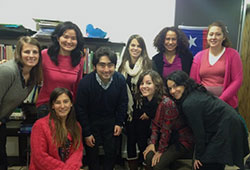
“My main project was a proposal to the Canadian Government requesting funding for a project to support civil justice reform in Latin America,” Mosby says. “It will be a major part of JSCA’s organizational operations for the next six years. I have worked on drafting, translating, editing, and planning the project.”
Law student Rachel Dowd was also in Santiago, working for Fiscalia del Medio Ambiente (FIMA), a nonprofit environmental law organization that works to promote environmental justice through litigation, community empowerment, and scholarly publications, where seven Washington University law students have interned since 2010, including alumna Junko Nozawa, JD ’12, LLM ’13, who was at FIMA during Dowd’s internship.
“I learned about Chile’s legal system and environmental law in a country that is both rich and poor with respect to law and natural resources,” Dowd says. “My responsibilities included researching and drafting legal memoranda pertaining to land use and zoning law in the U.S. and Chile, analyzing and summarizing recent court decisions relating to environmental law, organizing and cataloging FIMA’s library, assisting with the indexation of FIMA’s annual journal, and translating legal and academic documents. It was an added benefit to have a Washington University alum on site to help guide me.”
Conducting Dispute Resolution in Beijing, China
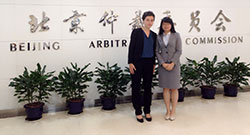
Law students Natalie Szlarb and Qingyang Wu both interned in China at the Beijing Arbitration Commission (BAC), where the law school has been placing interns for the past three years. BAC facilitates the resolution of cross-border, international commercial disputes through arbitration and mediation.
“I helped case managers communicate with parties and arbitrators, sent notices about the composition of various tribunals, notified parties of the claims against them, and requested submission of evidence for their defense,” Szlarb says. “I also sent notices to arbitrators notifying them that they had been selected, participated in some hearings, and revised a lot of documents, articles, and reports in English.”
In addition, Szlarb researched enforcement of international arbitration awards and current issues in enforcement of Hong Kong awards, and she helped scholars coming to the BAC from the United States and Australia to understand the organization’s work. The next issue of the BAC’s journal will feature an article by her on dispute settlement in investor-state claims under a future US-China bilateral investment treaty.
Like Szlarb, Wu also participated in the arbitration process, conducted pre-hearing preparations, and assisted with voluntary mediations under the supervision of assigned attorneys. The two students also enjoyed exploring Chinese life and culture, including visits to the Great Wall, the Forbidden City, various temples, and street markets.
Assisting Social Entrepreneurships in Seoul, Korea
Law student Cherrie Kim worked for an NGO, Merry Year Social Foundation, in Seoul, Korea, which provides micro loans and social enterprise assistance to defectors from North Korea.
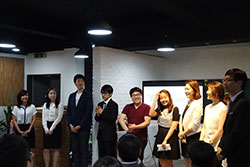
“My work mainly consisted of legal research, memo drafting, and translations. I made a presentation based on my findings about impact investing for social entrepreneurships,” Kim says. “Everyone I worked with was very friendly, but the legal culture in Korea is very different than the United States. Employees keep their work and personal life very separate, so I had to work to engage people in larger discussions of law and justice in the real world.”
One unique experience Kim had in Korea was going to a cat café. “You pay about $8 per person, which includes a beverage, and you get to spend time with more than 20 cats inside the café for as long as you want,” she explains. “Though I am terrified of cats, it was still a fun experience!”
Interning and Studying at The Hague

Both 2014 Hague Academy Fellow Sydney Tonsfeldt and Dagen-Legomsky Fellow Isaac Amon spent parts of their summer at The Hague. Tonsfeldt took a three-week public international law course at The Hague Academy of International Law, where she met students from all over the world, some of whom were high-ranking officials in their home countries. Tonsfeldt’s participation in the course was made possible through the Dagen-Legomsky Summer Public Interest Program.
“The lectures were given in either English or French, with real-time translations available in the other language,” she says. “This allowed me to practice my French before I head to the Sorbonne Law School, where I will be doing my third year of law school and earning an LLM.”
Tonsfeldt, who was on the award-winning 2014 Jessup International Law Moot Court, says her time at The Hague will also prepare her for next year’s competition, because one professor gave a week-long course on the “law of rebellion,” which is directly related to the competition’s problem.
Amon was an intern at the International Criminal Tribunal for the former Yugoslavia (ICTY). He was one of three interns assigned to the Stojic Defense Team in the Prlic et al. case. The Trial Chamber judgment was 2,500 pages and spread across six volumes, with a 600-page dissenting opinion.
“The judgment was originally issued in French, and it took a year to translate it into English,” Amon says. “The Notice of Appeal was due August 4, so all our objections on the basis of errors of law and/or fact had to be submitted by that date.”
Amon also wrote legal and factual memoranda, while analyzing the jurisprudence of the ICTY and its relevance to his team’s appeal. Additionally, he reviewed the Trial Chamber’s findings and cross-referenced them with the evidence—exhibits and witness testimonies—cited to support those findings.


